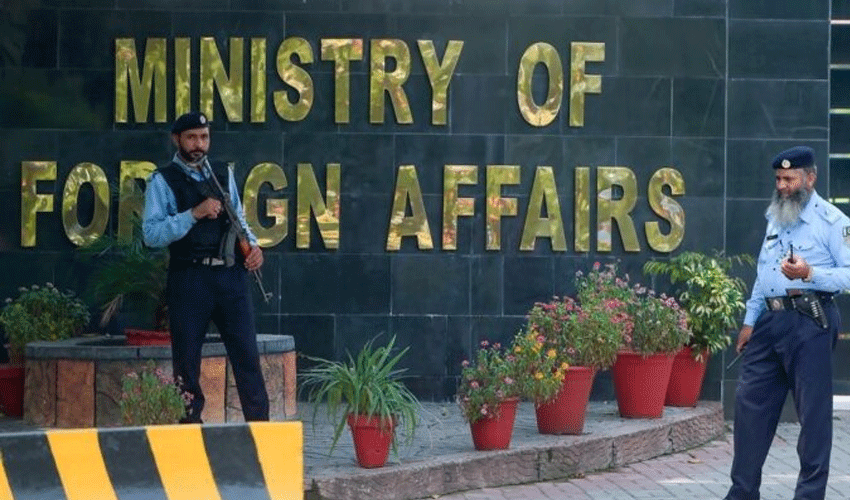Pakistan’s political, legal, and civil leadership has strongly rejected India’s alleged attempt to unilaterally terminate the historic Indus Waters Treaty, calling it a politically motivated and internationally invalid move.
Top government officials, including Foreign Minister Ishaq Dar and Federal Minister for Water Resources Mian Moin Wattoo, have described India’s actions as “unserious,” “immature,” and a deliberate effort to deflect from its internal issues. They reaffirmed that India cannot unilaterally exit from a treaty that involves international organizations, including the World Bank.
Govt calls out Indian allegations
In a statement, Ishaq Dar dismissed Indian accusations against Pakistan as baseless. “If India has any evidence, it should present it,” he said, referring to Indian claims following the Pahalgam attack in Indian-administered Kashmir, which Pakistan has termed a false flag operation.
Also Read: Tensions with India: Pakistan calls National Security Committee meeting
He further said that Pakistan's problems on the Indus Waters Treaty were ongoing and the country would respond to New Delhi's actions word by word.
“This is nothing but a political ploy. India is trying to blame Pakistan for its own failures,” Dar stated. He criticised New Delhi's post-incident behaviour as "extremely unserious" and driven by political immaturity.
He claimed that foreign observers appreciated Pakistan's stance, while the regional environment had been damaged by India. He also added that Pakistani media had so far played a very responsible role.
'Befitting reply'
Defence Minister Khawaja Asif has strongly rejected India’s attempts to walk away from the Indus Waters Treaty, stating that such actions cannot be taken unilaterally.
In a statement ahead of Thursday’s National Security Committee (NSC) meeting, the minister remarked that the agreement is not solely between India and Pakistan, but also involves the World Bank.
Also Read: Tensions with India: Pakistan calls National Security Committee meeting
Asif warned that any Indian move to exit the treaty would face a strong and unified response from Pakistan. “They’ve been trying to get out of the Indus Water Treaty for a long time,” he said, “but this treaty was signed under the umbrella of the World Bank, and India cannot simply suspend it.”
He stressed that the agreement’s international backing adds legal weight and prevents one-sided withdrawal. “The World Bank is also involved in the Indus Waters Treaty. India cannot make this decision alone. Pakistan will give a befitting reply to Indian actions,” he said.
Asif added that the government is preparing a comprehensive, well-thought-out reaction to India’s recent actions, including its statements and the controversial decision to halt water sharing under the treaty.
'Pakistan won't succumb to any pressure'
Federal Minister for Water Resources Mian Moin Wattoo also reiterated that India could not unilaterally terminate the Indus Waters Treaty, emphasising that Pakistan would not succumb to any pressure. He also warned that a strong and effective response would be given to any aggression.
Also Read: What is Indus Waters Treaty that India suspended? Find out here!
“International organizations are party to this treaty. India cannot just walk away from it,” he added. "Indian aggression will be responded to effectively."
Sindh fears impact on provinces
In Hyderabad, Dr. Qadir Magsi, chairman of the Sindh Taraqi Pasand Party, led strong criticism of India’s move, warning that any disruption to the treaty would disproportionately affect Sindh, already facing water shortages.
“India wants to start a civil war in Pakistan by terminating the Indus Waters Treaty,” Magsi said. “This is a conspiracy that could harm not just Pakistan, but also India itself.”
He also urged the government to raise the issue at the United Nations, stating that the decision goes against international law and the UN Charter. "The country is currently going through a critical situation," he maintained, adding that the decision was a conspiracy to eliminate the 16.5 million people of both countries.
Also Read: India suspends Indus Waters Treaty, expels Pakistanis, closes Attari post
"India should immediately withdraw the decision to terminate the Indus Waters Treaty," Dr Magsi insisted.
Magsi called for the termination of canal projects that divert water away from provinces like Sindh, Balochistan, and Khyber Pakhtunkhwa — regions already protesting over water and resource rights.
“When three provinces are on the streets, and India makes such a move, it’s clearly a conspiracy to divide Pakistan,” he warned, urging the government to safeguard national integrity.
Legal fraternity demands diplomatic action
In a rare political statement, the Supreme Court Bar Association joined the national chorus of protest, demanding that Indian diplomats be expelled within 48 hours.
Also Read: India violates international law with unilateral suspension of Indus Waters Treaty
Calling the Pahalgam incident “a classic example of a false flag operation,” the bar association said India’s decision to violate the treaty deserves a strong and united diplomatic response to uphold Pakistan’s sovereignty and national dignity.
Indus Waters Treaty
Signed in 1960 with the mediation of the World Bank, the Indus Waters Treaty is a landmark agreement governing the distribution of water from the Indus River system between India and Pakistan. The treaty has survived wars and decades of tension and is considered a vital instrument for regional peace and water security.
NSC meeting
The National Security Committee (NSC), chaired by Prime Minister Shehbaz Sharif, will convene on Thursday morning to formulate a strategic response. The meeting is expected to include a detailed review of regional developments, Pakistan’s legal position, and the broader impact of India’s moves on bilateral ties and regional stability.

























